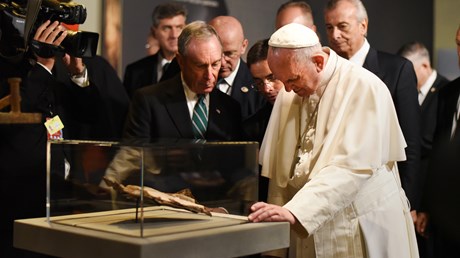Experts weigh in on Pope Francis’ recent support for changing the wording “lead us not into temptation.”

The church has a long history of fiddling with the Lord’s Prayer and debating the right wording.
Scripture itself isn’t unified on the wording. The Bible gives us two versions of the prayer—often referred to as the Our Father—one from Matthew’s gospel (Matt. 6:9–13) and one from Luke’s gospel (Luke 11:2–4).
Additionally, today we often forget that the last two lines (“for thine is the kingdom…”) aren’t from Scripture but were added later by well-intentioned churchmen who felt that ending with sin didn’t tell the whole story.
Then there’s the question of translations and traditions. If Matthew’s wording probably borrows a term that refers to financial debts in the original Greek, is it okay that many traditions say “trespasses”?
Pope Francis recently waded into the wording of the Lord’s Prayer by supporting a decision by the French Catholic church to change the wording of a line in the French translation of the prayer.
In an interview last week, Francis agreed that the new wording adopted by the French Catholic church was theologically clearer, suggesting that the previous version was not a “good translation.”
The phrase, “Ne nous soumets pas à la tentation” (roughly “Don’t subject us to temptation”) was updated this Sunday to be “Ne nous laisse pas entrer en tentation” (meaning “Don’t let us go into temptation.”) In English, the phrase is traditionally rendered “lead us not into temptation.” The concern for the French church and the pope is that the wording may suggest that God causes people to sin.
“It’s not about letting …
Source: Christianity Today Most Read